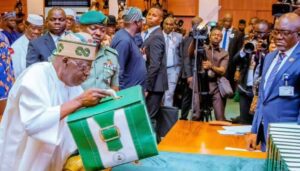
Amid fuel price hike, FG proposes N6.7trn subsidy for 2023
By Uthman Salami
Amid fluctuating price of Premium Motor Spirit (PMS), popularly known as Petrol, the Federal Government is proposing over N6.7 trillion on petrol subsidy payments in 2023.
Subsidy or under-recovery is the underpriced sales of premium motor spirit (PMS), the only product of crude that is yet to be deregulated.
While speaking at the presentation of the 2023-2035 Medium Term Expenditure Framework & Fiscal Strategy Paper (MTEF&FSP) in Abuja, the Minister of Finance, Budget and National Planning, Zainab Ahmed, said subsidy payment projection is based on two prevailing scenarios, which she itemised as business-as-usual or reform.
She said, “Scenario 1 is the Business-as-Usual. This is assuming that the subsidy on PMS, which is estimated at N6.72 trillion for the full year 2023, will remain and be fully provided for.”
“Scenario 2 – the Reform scenario: This assumes that petrol subsidy will remain up to mid-2023 based on the 18-month extension announced early 2021, in which case only N3.36 trillion will be provided for.”
However, in her presentation she noted that the government, in the MTEF&FSP also, proposed two aggregate expenditures for 2023 fiscal year which the Minister tied to two scenarios.
“In this scenario, given the severely constrained fiscal space, it is not feasible to make any provision for MDAs’ capital expenditure in 2023 beyond multilateral/bilateral loan-funded and donor- funded projects. The FGN’s 2023 aggregate expenditure is estimated at N16.98.
The FGN’s 2023 aggregate expenditure is estimated at N16.98 trillion, which is N337.05 billion (1.9 per cent) lower than the 2022 budget.
“The sums of N20.29trillion and N22.73 trillion are projected to be spent by the FGN in 2024 and 2025, respectively.”
“In the second scenario, federal government 2023 aggregate expenditure is estimated at N17.99 trillion, N669.82 billion (3.9 per cent) higher than 2022. (Inclusive of GOEs). The sums of N20.29 trillion and N22.73 trillion are projected to be spent by the FGN in 2024 and 2025, respectively,” the Minister explained.
“The new arrangement has indicated that NNPC will not be contributing monthly to the federation as they used to in the past. But NNPC will be paying royalties, dividends and taxes.
“So, while the revenue might not be monthly, we will work on an arrangement on how this will be paid. And it is possible to work out an arrangement where the payment could be monthly or quarterly.
“So, I was just saying that, in the new arrangement regime, NNPC will not be on a monthly basis; but NNPC will still be paying taxes, royalties and dividends.
“We will be engaging the NNPC on how we expect this to come. We can negotiate how these remittances will be done either on a quarterly basis for example” she explained on the issue of remittance.
She, however, said both scenarios have implications for net accretion to the federation account and projected deficit levels.
According to the Minister, the Federal Government has recorded a N2 trillion budget deficit between January and April.
She explained that the deficit further highlights the fiscal challenges confronting the current administration.
Ahmed also said that the Nigerian National Petroleum Company Limited which has funded the fuel subsidy until June will henceforth leave that responsibility to the federation, an action she said will create a strain on the economy.
In January, the Federal Government postponed the planned petrol subsidy removal for 18 months, citing “high inflation and economic hardship.”



